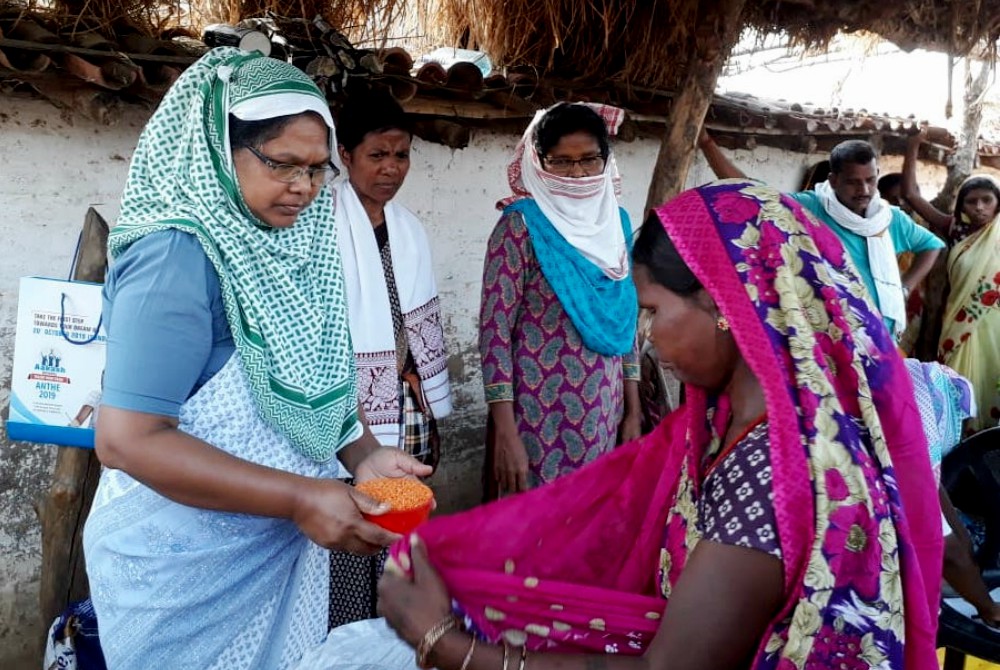
From left: Sr. Josephine Kisku, Sr. Sushma Ekka and Sr. Susan Tudu, all Sisters of Charity of Nazareth, distribute food in Chatra, India. (Courtesy of the Sisters of Charity of Nazareth)
The global health pandemic has slowed or even halted many things in the world: business, travel, food supply chains, everyday work.
But one thing continues: the work of humanitarians, those who, as the United Nations puts it, "provide life-saving support and protection to people most in need." That includes Catholic sisters who continue to reach out to the most vulnerable in the midst of the COVID-19 pandemic.
The U.N. designates Aug. 19 as World Humanitarian Day to honor humanitarian workers who have been killed or injured and those who continue working in vulnerable areas and communities.
This year's commemoration is marked by the global response to the pandemic, though the U.N. notes that pre-pandemic problems and challenges continue.
"Aid workers are overcoming unprecedented access hurdles to assist people in humanitarian crises in 54 countries, as well as in a further nine countries which have been catapulted into humanitarian need by the COVID-19 pandemic," the U.N. says on its World Humanitarian Day website.
Catholic sisters do many of the same things secular humanitarians do, but they are set apart because their call to serve is a way of life, not just a profession. To mark World Humanitarian Day, Global Sisters Report asked sisters and those they work with in four countries about their ministries in the face of the pandemic.
Malawi
Catholic sisters in the country have been serving those who are vulnerable during the global pandemic.
Sr. Teresa Mulenga, a member of Teresian Sisters, has been helping people with HIV/AIDS who have nowhere else to turn for the special care they need in these challenging times, most notably for antiretroviral drugs and therapy.
Malawi has 1 million people of all ages living with HIV, according to UNAIDS, the body leading the global effort to end AIDS as a public health threat by 2030 as part of the sustainable development goals.
Individuals with chronic illnesses like HIV/AIDS have a low immune system and are prone to contracting any disease, including COVID-19.
Mulenga works with five HIV/AIDS groups in Dedza, a town in the central region of Malawi, in the fight against COVID-19. She supplies foods that boost and improve people's immune systems to help fight colds, the flu and other viruses like the coronavirus. She also supplies buckets for keeping water for washing hands, bar soaps and hand wash to members of five support groups, reaching a total 125 households.
"I have been giving them nutritious foods and medication to ensure they are healthy amid the pandemic," she said. "I also give these people [living with HIV/AIDS] buckets, sanitizers, masks and soap for washing hands to prevent the spread of the virus. I'm worried about them because of their current condition and, now, the deadly coronavirus."
Mulenga said her focus before was to empower people living with HIV/AIDS, but everything has changed and now she is focused on fighting COVID-19, which is a challenge, as they still need to help victims with other basic things.
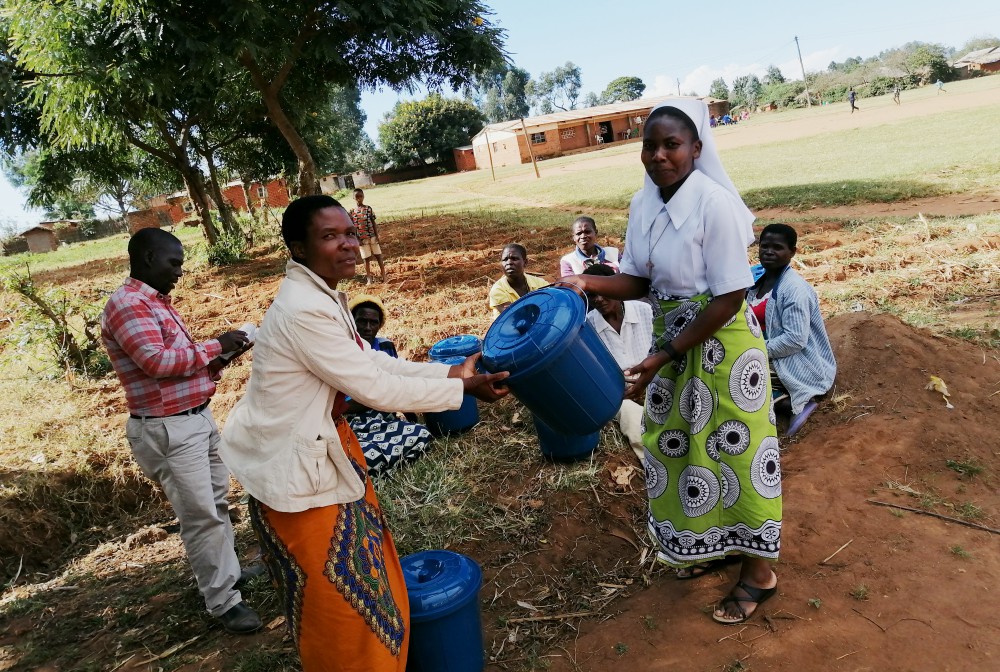
Sr. Teresa Mulenga distributes tap buckets for use by five HIV/AIDS support groups in Dedza, a town in the central region of Malawi, in the fight against the COVID-19 pandemic. (Provided photo)
"The outbreak of the pandemic has brought a big challenge to me and the people I serve," she told GSR. "Before, I used to gather these people [living with HIV/AIDS] together at least thrice a week. We had a program of rearing pigs, which was a stable source of food and income to these people. But now, we have stopped due to the regulations put in place, like social distancing, to fight COVID-19."
One of the beneficiaries who is living with HIV told GSR that several sisters led by Mulenga have been reaching out to them with bags of food and antiretroviral drugs to help sustain themselves during the pandemic.
"We are poor and sick," said the man, who asked not to be identified because of the stigma against HIV and AIDS in Africa. "The sister has helped us so much. We are able to support ourselves through her help. The sister has been supplying food and medication to us during the pandemic. She has risked her life for us, and we are really worried about her and at the same time grateful to her help."
"Right now, we feel safer because we have everything like other people. We are able to eat and take our daily medicines. We also have face masks and hand sanitizer to protect ourselves from the disease," he added.
Kenya
COVID-19 has deeply affected women's rights in the East African country, with reports suggesting there is a rise in female genital mutilation because of disruption in prevention. In Kenya, 21% of women and girls ages 15-49 have undergone some form of such mutilation, which usually involves the partial or total removal of the female genitalia and can cause a host of serious health problems, according to the U.N.
Since the start of the COVID-19 outbreak and the immediate closure of schools, West Pokot, a county in northern Kenya that borders Uganda, has received reports of more than 500 cases of girls undergoing female genital mutilation by force.
"Girls are not going to school, they are just sitting at home. Some are coming of age. Parents are facing an uncertain future due to loss of income caused by the coronavirus, so they are having the girls cut and will marry them off," Domtila Chesang, an anti-mutilation campaigner in the region, told Thomson Reuters Foundation News.
Catholic sisters in northern Kenya, the region most affected by the high number of cases of genital mutilation, have been making house-to-house checks to create awareness and ensure young girls are not cut and married off. Communities here believe girls must be circumcised to prepare them for marriage, and if they are not, they are still viewed as girls and not women.
Advertisement
Sr. Gisele Ndekezi of the Institute of the Daughters of Mary Help of Christians, or the Salesian Sisters of St. John Bosco, said her community has been helping poor girls from these communities with sanitary pads and underwear during the pandemic.
"We are worried about these girls because they went back to the same society which supports FGM after schools closed," she said. "But we are reaching out to them to ensure they are safe. We have created a WhatsApp group to make sure they alert us in case of anything. We have also supplied them with soaps and facemasks to help prevent the spread of coronavirus."
India
The Sisters of Charity of Nazareth continue their ministry in the face of ongoing lockdowns and an overall situation that is challenging, even dire.
"People have lost jobs, and so there is no food on the table," said Sr. Teresa Kotturan, an Indian Sister of Charity of Nazareth and the U.N. representative for the Sisters of Charity Federation, who closely monitors the situation in India.
Kotturan told GSR in an interview that a particular challenge for India now is that internal migrants within the country have lost jobs, most in urban centers, and are returning to their native communities in rural areas only to find no employment. Also returning are Indian migrants who have lost jobs in other countries, many in the Middle East. The returning migrants number in the millions, she said.
"There is anxiety and a sense of hopelessness," Kotturan said. But, she added, the work of sisters and other humanitarians is aimed at easing the immediate challenges. "Everyone is reaching out as best they can."
In the northern city of Patna, the sisters distribute various provisions, including face masks, soap, sanitizers, clothing and medicines. In all, said congregational spokeswoman Dana Hinton, the sisters in the Patna province have distributed face masks and other supplies to more than 10,000 families. They also have initiated community-based awareness programs on COVID-19.
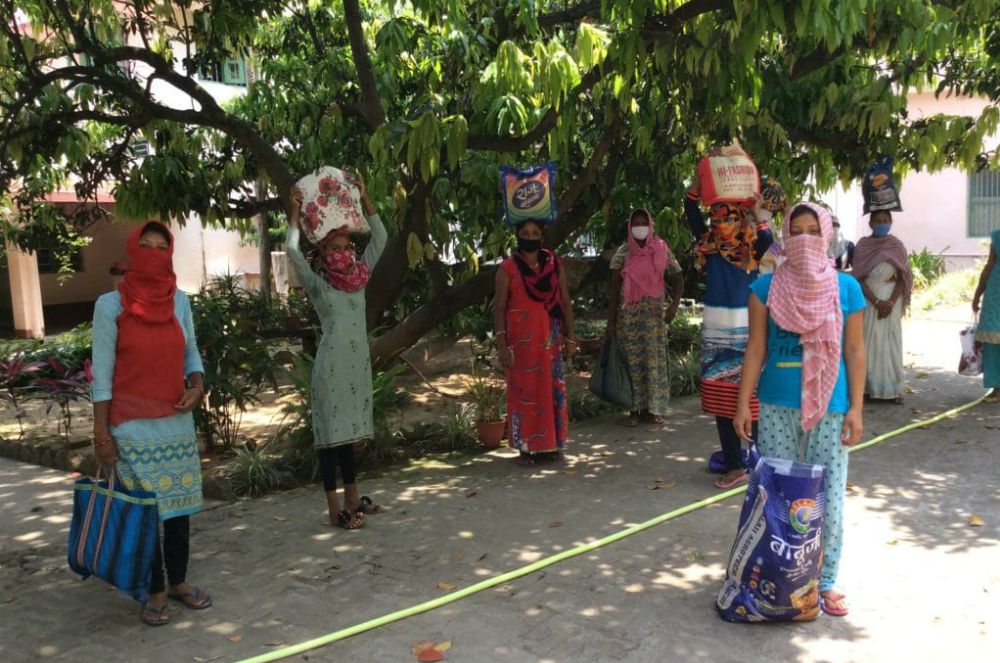
Indian women on the road during the ongoing lockdown because of the COVID-19 pandemic (Courtesy of the Sisters of Charity of Nazareth)
In their efforts, the sisters are collaborating with the Patna Diocese, local government bodies and humanitarian groups, such as Oxfam. Hinton also said sisters in India are fasting and using the money that would be spent for their own food to those who need meals.
Hinton said as a sign of solidarity, Sisters of Charity of Nazareth in the United States have donated their federal stimulus checks to boost their congregational efforts in India and elsewhere.
Those moves generate needed solidarity and goodwill at a moment when the Sisters of Charity of Nazareth in India encounter daily challenges.
"Life during the pandemic has been anything but certain," Sr. Elizabeth Jaya Rani, principal of Nazareth Convent High School in Vasai, recently wrote for a congregational blog.
The western India region "has been the most affected by COVID-19 in the country as of now. Many families of our students have felt its impact either physically, or mentally or financially," she wrote.
"I have been meeting parents (with all safety measures) who share their struggles with the loss of a job or pay reduction or loss of loved one, the list goes on," Rani wrote, adding she has been moved by "the sensitivity of this Catholic community here in Vasai so closely knit together that they feel the pain of their neighbors."
This means providing groceries for families and paying for medical treatment for families personally affected by the coronavirus.
"The pandemic is scary but moments such as these make me believe in the love that humanity continues to profess," Rani wrote. "The struggle is ours as much as it is the struggle of the families of our students. We pray that all shall be well."
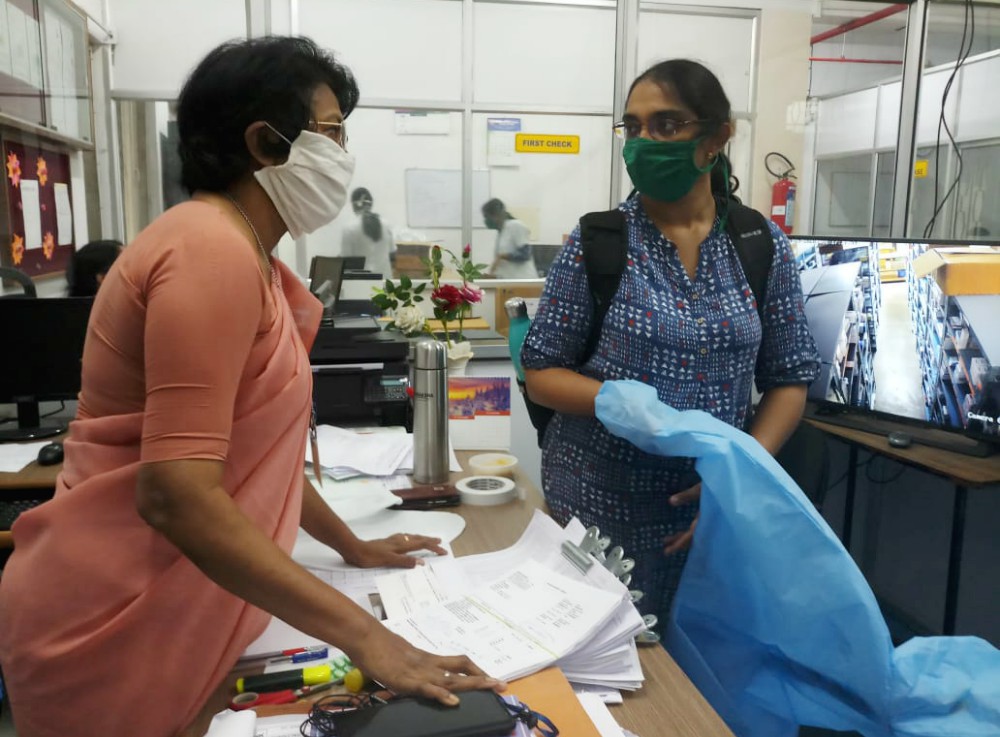
Sr. Jessie Saldanha, left, of the Sisters of Charity of Nazareth meets with an employee at St. John's National Academy of Health Sciences in Bangalore, India. She is head of the institution's pharmacy department. (Courtesy of the Sisters of Charity of Nazareth)
Another Sister of Charity of Nazareth, Sr. Jessie Saldanha, works at St. John's National Academy of Health Sciences in Bangalore as head of its pharmacy department. Despite her own struggles with arthritis, Saldanha has made sure that hospital staff members have had the proper personal protection equipment needed to do their work.
"The true family spirit of the medical staff and the supportive administration at St. John's motivate me each morning to support them in my efforts to keep them all safe," Saldanha told the community, Hinton said. "These times have stretched me to the limits I knew not. It has brought out an indomitable spirit and a deep desire to care for the patients beyond my personal needs and wants."
Saldanha praised the generosity of hospital donors for helping the staff procure needed supplies and said she was thankful that "every COVID-19 patient who walked out of our campus keeps me trusting in divine providence."
El Salvador
Ministry by Salvadoran sisters working under the umbrella of the Color Movement, an initiative by the humanitarian organization Alight and the sisters-run nonprofit Sisters Rising Worldwide, has "not slowed down," said Raquel Orellana, the San Salvador-based program leader for the Color Movement.
"The sisters have been on the front lines of COVID, attending to their communities' most urgent needs," Orellana told GSR in an email.
Early on, 28 sisters worked with doctors and medical advisers organized by Alight to prepare communities to fight the spread of the virus. The efforts reached nearly 2,000 people from the communities where sisters work: Popotlán, La Chacra, Suchitoto, Colonia Dolores, El Calvario and Amatepec. The sisters delivered emergency and livelihood supplies to families who, in turn, helped distribute items in their communities. Sisters also distributed social distancing messaging through social media and posters.
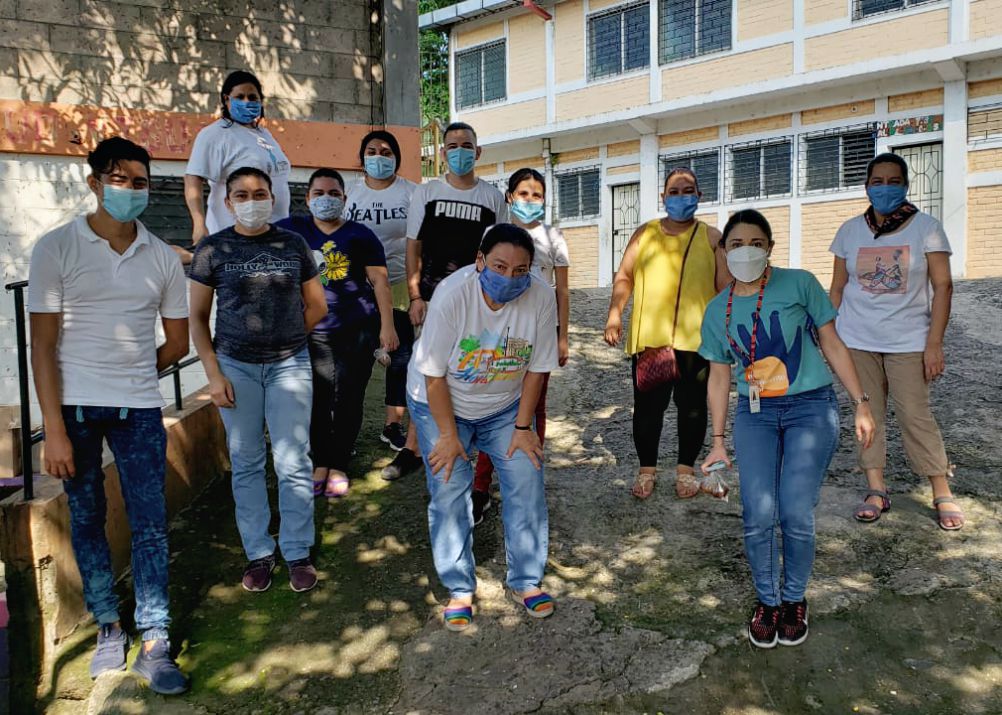
In El Salvador, sisters and volunteers work together to distribute assistance in the face of the COVID-19 pandemic. (Provided photo)
Complicating the situation was an ongoing response to Tropical Storm Amanda, a May storm that caused flooding and landslides and affected vulnerable communities throughout the country. With Alight's help, local Salvadoran groups raised more than $18,000 to cover basic needs, and sisters and community members helped distribute food, basic hygiene items, blankets and mattresses to about 1,500 people.
With the help of volunteers, sisters distributed some of the items at sister-run youth centers, with masks and social distancing as the norm, Orellana said. In rural areas, sisters and volunteers delivered food packages home by home. Community leaders distributed blankets locally.
The sisters also are part of a larger nationwide initiative that began at the end of April to help counter increased poverty and hunger: a "white flag movement" in which residents place white shirts or aprons outside their homes or on roadsides to signal they need assistance, particularly food. The movement harks back to the Salvadoran civil war of the 1980s, in which civilians used white flags to signify they were not aligned with armed groups.
Guardian Angel Sr. Concepción Marroquín Nolasco is one of the sisters bringing relief to hard-hit families.
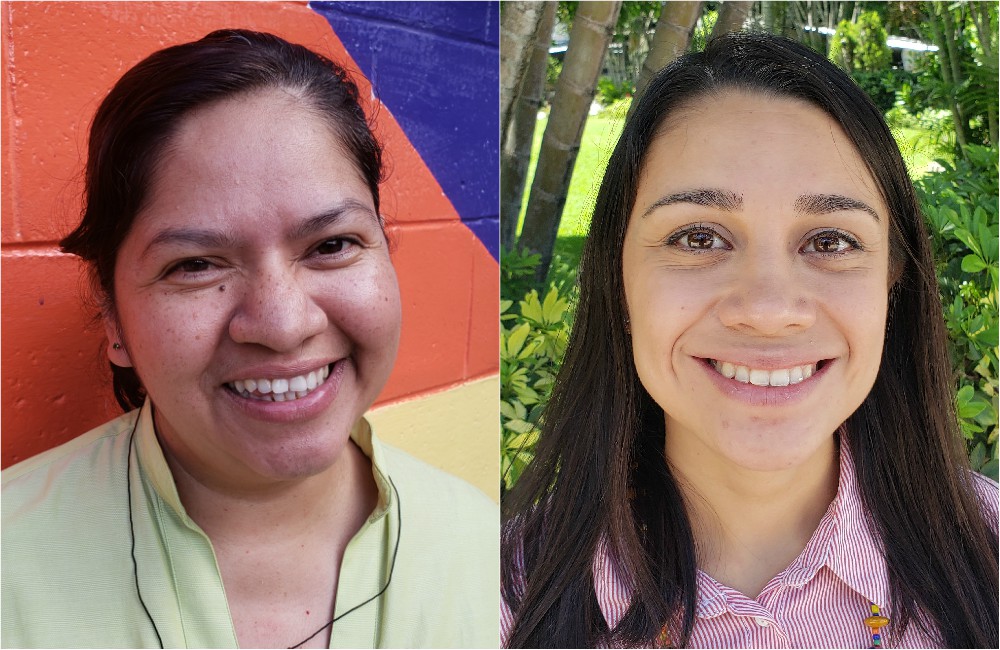
Guardian Angel Sr. Concepción "Conchy" Marroquín Nolasco, left, and Raquel Orellana, the San Salvador-based program leader for the Color Movement (GSR file photos)
"Sister Conchy Marroquín did not sit idly by," Orellana said.
Marroquín and young people in the communities searched for families "who had gone out on the roadsides with white flags."
Marroquín and other sisters are also discerning how best to safely reopen the centers for young people to gather safely in areas where urban gang activity is common. Sisters and Alight staff are working with the young people to determine next steps in order "to keep protecting and empowering youth under this new 'normal,' " Orellana said.
The current times are difficult, but "sisters are overcoming this situation with hope and love," Orellana said.
Marroquín agreed. "The faith in our people has given us strength during these difficult times," she said. "It is necessary to maintain joy and hope."
[Chris Herlinger is GSR international correspondent. His email address is cherlinger@ncronline.org. Doreen Ajiambo is the Africa/Middle East correspondent for Global Sisters Report. Follow her on Twitter: @DoreenAjiambo.]








